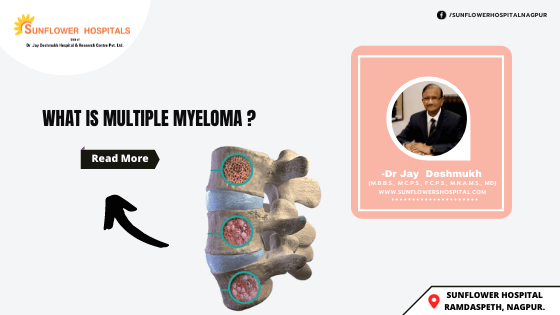What type of cancer is multiple myeloma?
Our blood has many different types of cells. These are red blood cells, white blood cells, and plasma cells. Plasma cells help us to fight against infection. Plasma cells form antibodies. These antibodies recognize an invading organism and the antibodies help us to destroy these invaders. Multiple myeloma is a blood cancer originating from plasma cells.
How common is multiple myeloma?
The incidence is slightly less in India than in the western population. The reported incidence in India may be about more than 50,000 people per year, with about, 15000 deaths due to myeloma per year.
What causes multiple myeloma?
It begins with one abnormal plasma cell in the bone marrow that multiplies rapidly. Cancer cells do not mature like normal cells and do not die like normal cells. They multiply very rapidly in the bone marrow, replacing the normal cells. This leads to fatigue and the inability to fight infections.
What are the symptoms of multiple myeloma?
Bone marrow affects blood and bone marrow. Lymphoma develops in the lymphatic system. The lymph nodes, spleen, and liver belong to this system. While multiple myeloma is a cancer of plasma cells present in bone marrow and blood.
Is there a cure for multiple myeloma?
Myeloma can be controlled, but not cured. Treatment can cure your symptoms and slow down the disease. Some treat-Most of the cancers are well known to people. Cancers of the breast, stomach, colonial cavity, and ovaries are well known to people at large. However, blood cancers are a mystery to most people. Many are unaware of the types of these cancers. One type of
blood cancer is Multiple Myeloma. The symptoms may vary a great deal. In fact, in the early stage, there may be no symptoms at all. The common symptoms may be fatigue, increased bruising or bleeding, bone pains, difficulty fighting infections, poor appetite, weight loss, nausea, constipation, or a confusional state.
What is the difference between multiple myeloma, leukemia, and lymphoma?
All these three cancers start in the blood cells but affect different parts of our body. Generally, leukemia starts in the inclement options \c! immunology- ‘ ambulatory drug
therapy, antibody therapy, chemotherapy, radiation treatment, bone marrow or stem cell transplant and certain other drugs. Treatment to strengthen bones, antibiotics, treatment for kidneys if myeloma involves kidneys is often necessary.
How is myeloma diagnosed?
This is done by blood and urine tests. A bone marrow biopsy will reveal if cancer cells are present. Imaging modalities like X-rays, CT scans, and Shift scans are useful to assist in diagnosis and treatment.
What happens after treatment?
Treatment does not cure the disease but helps you to live longer. After treatment, frequent follow-ups are required to see if the disease has returned. Many symptoms become more bearable to the person. Follow-up tests include blood and urine tests, imaging tests, and bone marrow biopsy. If the disease conies back, your doctor may change therapy and start some new therapy.
What is the criterion of diagnosis?
A bone marrow biopsy or aspirate showing at least 10 % of the cells are plasma cells or the presence of a plasma cell tumour known as plasmacytoma. Evidence of damage to the body as a result of plasma cell growth such as severe bone damage, kidney failure, anemia, or high calcium levels supports the diagnosis strongly. The presence of free light chains or M121 showing one lesion involving bone or bone marrow further helps in diagnosis and treatment. Multiple myeloma is a serious disease, however, if diagnosed early people are likely to survive for a long time. Lisa Ray and Kirron Kher are living examples of the same.


